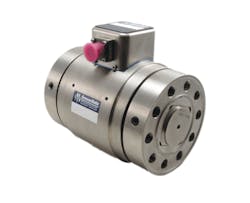The Dyno LaborSaver Series of dual-range rotating torque sensors features a 5:1 ratio capacity of 0 to ±full scale.
The series allows for dual measurement capabilities and extended capacities to accommodate most testing requirements as a single unit, reducing downtime.
Six base models are available with the high-bridge Dyno LaborSaver in standard ranges from 100 to 500,000 lb-in. The low-range bridge version offers capacities from 0 to ±1/5 full scale of the higher range. Units feature high accuracy on both distinct bridges. Voltage outputs are either simultaneous for both bridges or selectable to suit requirements. High torsional stiffness and low rotating inertia allow for high-frequency response.
SensorData Technologies (586) 739-4254
About the Author
Sign up for our eNewsletters
Get the latest news and updates

Leaders relevant to this article:

